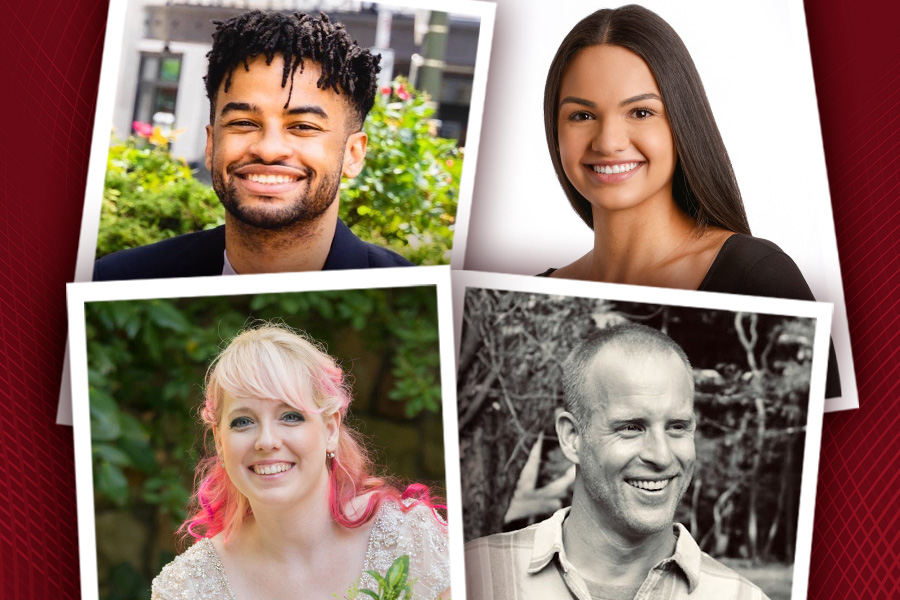
Powering Change
Alumni entrepreneurs are making their mark in finance, augmented reality, baking and environmental justice
By Amanda S.F. Hartle
Carnegie Mellon University alumni don’t just imagine the future, they create it.
During November’s National Entrepreneurship Month, we’re celebrating the Tartan entrepreneurs around the world who are bringing groundbreaking ideas to market and building successful startup businesses.
To date, the CMU community has launched more than 400 startups and created more than 152 spinoff companies.
"Carnegie Mellon offers incredible support to our students, faculty and alumni startups that help set them up for entrepreneurial success,” says Dave Mawhinney, executive director of CMU’s Swartz Center for Entrepreneurship and Donald H. Jones Center for Entrepreneurship and associate teaching professor of entrepreneurship.
“The Swartz Center for Entrepreneurship supports programs specifically designed to help our alumni get customers, talent and investment. These include VentureBridge, the CMU Tech & Entrepreneurship Alumni Group and 99Tartans. We are proud that Carnegie Mellon is recognized as one of the top entrepreneurial universities in the world today and even prouder of the achievements and accomplishments of our Tartan founders."
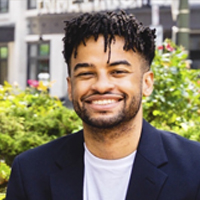 “You’re forced to be more creative with your approach to things such as access to capital and markets. This challenge is also my favorite part of the journey. I’m my full self in my work. I engage with the community on their terms, and most of all, I work on a problem that I care about deeply.”
“You’re forced to be more creative with your approach to things such as access to capital and markets. This challenge is also my favorite part of the journey. I’m my full self in my work. I engage with the community on their terms, and most of all, I work on a problem that I care about deeply.”
DARREN RILEY (DC 2014)
CEO AND CO-FOUNDER, JUSTAIR SOLUTIONS
Better Breathing Environments for All
CEO and co-founder of JustAir Solutions Darren Riley was in his mid-20s when he developed asthma after moving to one of the most polluted ZIP codes in the United States.
His diagnosis showed him how much the environment in which we exist and the air we breathe influences our quality of life.
So he launched JustAir — combining his lived experiences as a Black man with air pollution-related health issues and his Dietrich College of Humanities and Social Sciences information systems degree.
The company’s small sensors monitor the air we breathe at the neighborhood level, map pollutants, magnify air quality disparities from one zip code to the next and visualize the activities and trends that drive an area’s air quality.
“With our monitors and insight tools, communities can more accurately identify sources of pollutants,” Darren, who graduated in 2014, says. “They can then develop data-driven solutions to protect the breathing environment for our most vulnerable groups.”
According to the Centers for Disease Control and Prevention data, urban neighborhoods of color are disproportionately affected by poor air quality — a stark reality that resonated with Darren in summer 2020.
“When George Floyd was murdered, I became more keen on this space and committed to using my technical skills to move the needle on systemic environmental justice issues impacting communities of color.”
 A total of 11 JustAir sensors are installed throughout Grand Rapids, Michigan. The company’s sensors in the Roosevelt Park neighborhood, which has the highest non-white population in the city, recorded many more unhealthy days than the one near the city’s previous lone monitor required by the federal Environmental Protection Agency. Thanks to JustAir, the community has information they can use to create a better breathing environment for all.
A total of 11 JustAir sensors are installed throughout Grand Rapids, Michigan. The company’s sensors in the Roosevelt Park neighborhood, which has the highest non-white population in the city, recorded many more unhealthy days than the one near the city’s previous lone monitor required by the federal Environmental Protection Agency. Thanks to JustAir, the community has information they can use to create a better breathing environment for all.
JustAir is looking to expand into other cities while also building upon the company’s community collaboration efforts. Soon, they’ll also be piloting new pollution source detection and traffic impact tools.
Darren credits his entrepreneurial path to his time at CMU where he was also a member of the basketball team.
“While success as an entrepreneur has a degree of luck to it, CMU trained me to view entrepreneurship as a practice like a sport where you learn through trial and error in order to mitigate the risk of future uncertainty.”
Darren says he knows his journey as an underrepresented founder is “not traditional,” but he finds it incredibly rewarding.
“You’re forced to be more creative with your approach to things such as access to capital and markets,” he says. “This challenge is also my favorite part of the journey. I’m my full self in my work. I engage with the community on their terms, and most of all, I work on a problem that I care about deeply.”
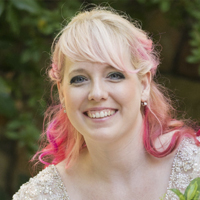 “My CMU education and design experience have helped a ton. When you’re a startup, every dollar counts, and being able to design my own logo, website, packing tape and more has saved Fikabröd a ton of money. From day one, Fikabröd has had a whimsical, professional, cohesive look, and all I’ve had to spend on any branded and custom items is my time.”
“My CMU education and design experience have helped a ton. When you’re a startup, every dollar counts, and being able to design my own logo, website, packing tape and more has saved Fikabröd a ton of money. From day one, Fikabröd has had a whimsical, professional, cohesive look, and all I’ve had to spend on any branded and custom items is my time.”
BECKY CLUTTER (CFA 2004)
FOUNDER, FIKABRÖD
Tastes and Tools for Beginning Bakers and Advanced Pâtissiers
When life gave Fikabröd founder Becky Clutter lemons in early 2019, she did what any home baker would do and made lavender lemon scones.
“I went on sabbatical from my job as a creative director to work on my mental health after the death of my basset hound Preston Reese Carnegie,” Becky says. “I have always loved baking, but I had sort of lost that part of myself.”
As she struggled with “grief, depression and suicidal thoughts,” she tasked herself with baking at least once a week. Soon, she was binge-watching “The Great British Bake Off” and reading cookbooks for fun. To help her try out new ingredients, tools and recipes, she searched for a baking-related monthly subscription box, but her cart remained empty.
“All the other baking subscription boxes out there are baking kits with premeasured ingredients for a specific recipe,” says Becky, who graduated from the College of Fine Arts in 2004 with a bachelor’s degree in communication design and a minor in photography and digital imaging.
“There wasn’t anything geared towards more moderate to advanced bakers who already have flour, sugar and a multitude of chocolate chips in the house at all times. Nothing existed for us adventurous, incredibly passionate home bakers.”
Fikabröd’s monthly boxes provide home bakers — from beginners to advanced pâtissiers — with full-size ingredients, tools, decorations and other goodies.
 “Our boxes are for the baking obsessed,” Becky says. “We do the work of finding unique, international and small-batch products. This allows our subscribers to play in the kitchen, even if they don’t have the time to search for or local access to these types of ingredients.”
“Our boxes are for the baking obsessed,” Becky says. “We do the work of finding unique, international and small-batch products. This allows our subscribers to play in the kitchen, even if they don’t have the time to search for or local access to these types of ingredients.”
Growing up, Becky watched her father found several companies, so she knew being an entrepreneur was an option for her. She also knew she wanted to study the arts and be surrounded by students studying a variety of subjects during her college experience.
Her brother was attending the College of Engineering when her father sent her information on the School of Design’s communication design program. She knew immediately that it was the perfect recipe for her success — a mixture of creativity and logic.
“My CMU education and design experience have helped a ton,” Becky says. “When you’re a startup, every dollar counts, and being able to design my own logo, website, packing tape and more has saved Fikabröd a ton of money. From day one, Fikabröd has had a whimsical, professional, cohesive look, and all I’ve had to spend on any branded and custom items is my time.”
“As a CMU alum, I’m no stranger to hard work, long hours and balancing lots of deadlines, which are all part of being an entrepreneur!”
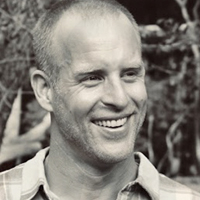 “There is vast inequality of access to financial education. Not every child grows up with a Wall Street Journal on the kitchen table, a parent who works in finance, or with a Roth IRA set up for them at age 15. This transfer of knowledge and ownership to our users is my definition of empowerment.”
“There is vast inequality of access to financial education. Not every child grows up with a Wall Street Journal on the kitchen table, a parent who works in finance, or with a Roth IRA set up for them at age 15. This transfer of knowledge and ownership to our users is my definition of empowerment.”
GENE NATALI (TPR 2007)
CEO AND CO-FOUNDER, TROUTWOOD
Financial Planning for Gen Z and Beyond
Three years ago, Troutwood CEO and co-founder Gene Natali spoke to a United Nation’s Task Force on Financial Empowerment. As he left the meeting, a piece of whispered feedback changed his life.
“One of the attendees pulled me aside and said, ‘The world needs this, don’t stop here.’ Troutwood was formed at that moment,” says Gene, who graduated from Tepper School of Business in 2007 with an MBA focusing on manufacturing and operations systems.
A software company that meshes fintech, edtech and wellness tech, Troutwood helps Gen Zers own their financial future. With their flagship mobile-first app, users gain a quality personal finance plan, the knowledge to use it and the tools to be financially independent.
“The software is capable of adapting to changes in a user’s life with modeling traditionally reserved for financial advisors and their high-net-worth clientele,” Gene says. “We are building a solution that goes beyond rehashing account balances and gamified quizzes by bringing together cutting-edge research in behavioral finance with machine learning and AI to create a proprietary ‘virtual trustee’ that keeps users on-track to reach their goals.”
Gene and Jeff Davidek, his co-founder, bring nearly two decades of financial industry experience including with young adults who “are trying to make sense of their Robinhood accounts, navigating new hire packets and, too often, riding an emotional roller coaster of behavioral biases,” Gene says.
Many of these young adults soon realize they never learned foundational finance skills, nor do they have the money required by traditional financial planning services — a combination that results in requiring money to acquire informed financial advice.
“There is vast inequality of access to financial education,” Gene says. “Not every child grows up with a Wall Street Journal on the kitchen table, a parent who works in finance, or with a Roth IRA set up for them at age 15. This transfer of knowledge and ownership to our users is my definition of empowerment.”
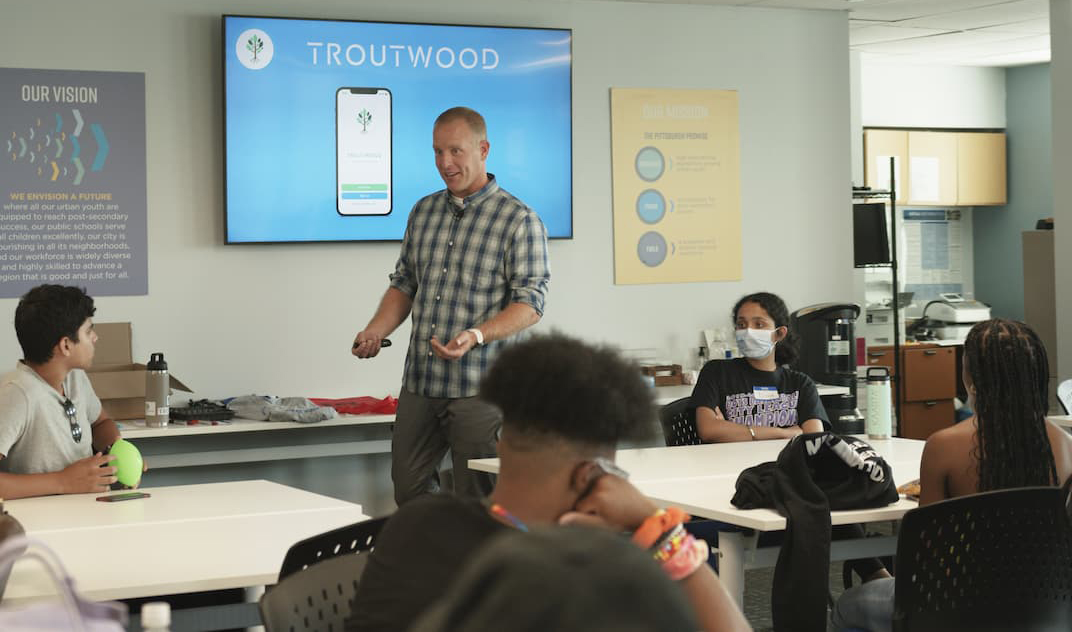 Perspective from his days at CMU has shaped the company.
Perspective from his days at CMU has shaped the company.
“It was riveting to hear how my water polo teammates spent their days across CMU’s various schools,” Gene says. “It opened my eyes to the value of collaboration and the power of diverse experiences.”
Fellow Tartans on his leadership team help him work toward achieving Troutwood’s mission including his chief technology officer and Class of 2017 School of Computer Science alum Yazid Hamdi, who holds a master’s degree in software engineering, and executive vice president of product development and 2013 Tepper School of Business alumnus Eric Fencil.
Together, they’re soon releasing free and SAAS versions of the company’s new integrated financial forecasting and budgeting application.
“We believe if you own your financial plan, you own your financial future,” Gene says. “We aspire to build software with the power to change lives. It’s a choice we made and an objective we will achieve.”
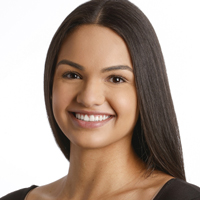 “My biggest challenge and greatest success so far is the same answer: people. Anything worth having doesn’t come easy, but the greatest blessing of my entrepreneurial journey has been the group of amazing people around me.”
“My biggest challenge and greatest success so far is the same answer: people. Anything worth having doesn’t come easy, but the greatest blessing of my entrepreneurial journey has been the group of amazing people around me.”
ALEX CUSELL (CMU 2022)
FOUNDER, JISELL
Gifting in Augmented Reality
As Jisell founder and Class of 2022 alumna Alex Cusell looked over a pile of gifts from her wedding shower in advance of a cross-country move to pursue her degree at Carnegie Mellon University in Silicon Valley, one type of gift rose above the others.
“Despite my friends and family having the absolute best intentions, we ended up with a lot of gifts that just didn’t work for us as the last thing we wanted right then was more stuff,” Alex says. “It became clear that the front runner in all of this was gift cards.”
But she quickly realized, even the 20 or so of those she had weren’t the perfect gift either. The small pieces of plastic cluttered her wallet. She couldn’t remember how much money each one was worth. She forgot to use them when shopping.
The seed for her company was planted in her mind as she pursued her master’s degree in technology ventures from the Integrated Innovation Institute, or as she calls it “a crash course in entrepreneurship.”
“I decided to solve two problems: make gift cards exciting, thoughtful and personal to give with an augmented reality experience and create a universal gift card e-wallet.”
Jisell has solved the digital wallet problem and launched in Apple’s App Store a few months ago. Users can now digitize all their physical gift cards in one app and redeem with a barcode scan. Alex expects to launch the company’s AR component this fall.
“My biggest challenge and greatest success so far is the same answer: people,” Alex says. “Anything worth having doesn’t come easy, but the greatest blessing of my entrepreneurial journey has been the group of amazing people around me.”
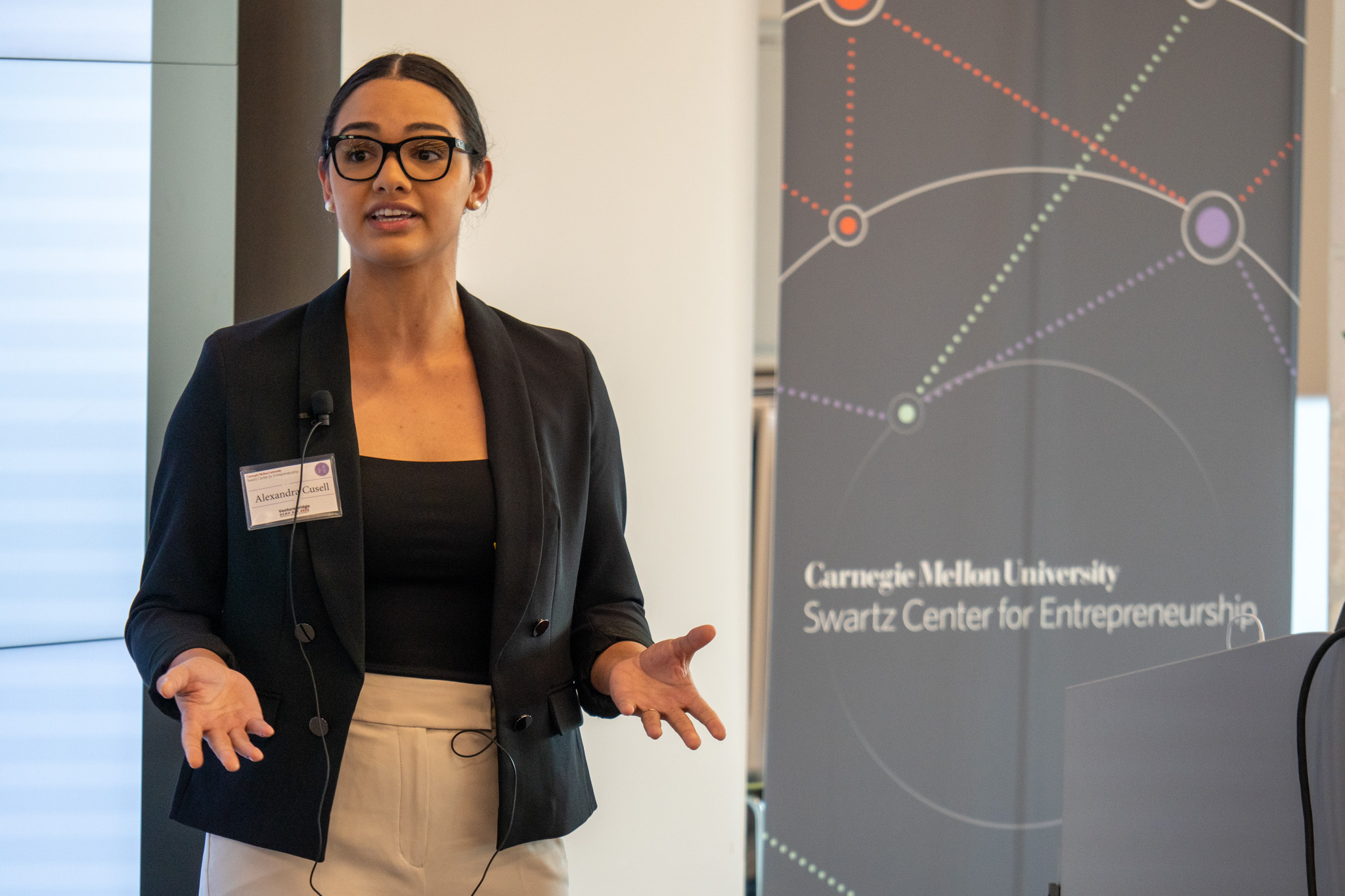 She was chosen as a 2021-2022 Swartz Entrepreneurial Fellow, and the company was part of the summer 2022 VentureBridge cohort. VentureBridge, an initiative of the Swartz Center for Entrepreneurship that provides seed funding, office space and networking opportunities with mentors and investors, among other benefits, has connected Alex with the CMU community’s expertise from idea to launch to updates.
She was chosen as a 2021-2022 Swartz Entrepreneurial Fellow, and the company was part of the summer 2022 VentureBridge cohort. VentureBridge, an initiative of the Swartz Center for Entrepreneurship that provides seed funding, office space and networking opportunities with mentors and investors, among other benefits, has connected Alex with the CMU community’s expertise from idea to launch to updates.
“CMU was the first investor in Jisell, and the support has been beyond anything I could ever have imagined.”
Alongside her team of Frank Xia, Panchaporn Eungrattanakorn and Siddartha Varma, Alex looks to the future as she also leans on her past for inspiration. Her mother immigrated to the United States from Cuba as a young child. She didn’t speak English, and she knew few people.
“Despite these challenges, she worked tirelessly to achieve the American dream and even started a few of her own companies,” Alex says. “Her products were sold at Jo-Ann Fabrics and Crafts and Walgreens and on QVC.
“Seeing her ambition taught me that I never wanted to do anything that I didn’t love with my whole heart.”




